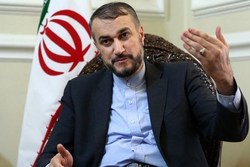 Advisor to the Iranian Parliament Speaker Hossein Amir Abdollahian said that the secret visit of US President Donald Trump to Iraq vis-à-vis the pre-announced visit of Secretary of Iran's Supreme National Security Council (SNSC) Ali Shamkhani to Afghanistan demonstrates the truth about Iran and the US.
Advisor to the Iranian Parliament Speaker Hossein Amir Abdollahian said that the secret visit of US President Donald Trump to Iraq vis-à-vis the pre-announced visit of Secretary of Iran's Supreme National Security Council (SNSC) Ali Shamkhani to Afghanistan demonstrates the truth about Iran and the US. RNA - Amir Abdollahian, in a tweet posted on Thursday drew a comparison between the visit of Iran’s security chief to Afghanistan and that of the US president to Iraq, implying that how secretly visiting a less dangerous country (Iraq) is humiliating for a country with massive military presence in the region.
"At one time, Leader’s envoy and Secretary of the Supreme National Security Council Rear Admiral Ali Shamkhani traveled to ‘very dangerous’ Afghanistan with a previous announcement, however US President Donald Trump secretly made a visit to ‘less dangerous’ Baghdad under the cover of making surprise Christmas visit to US troops in Iraq,” read his post, concluding, “This is the truth about Iran and the US!"
Several Iraqi legislators condemned US President Donald Trump's snap visit to the country, calling for the approval of a bill to force Washington to withdraw its forces from Iraq.
Salam al-Shamri, a member of Sa'eroun faction at the Iraqi parliament, in a statement on Thursday deplored Trump's surprise visit as violation of Iraq's sovereignty, ignorance of international laws and continued threat against the neighboring states, calling on all political groups to immediately approve the bill to expel the US forces.
Also, Jamal al-Fakhir, another member of Sa'eroun faction, described Trump's visit as disrespect for the victims of the US-sponsored terrorism in Iraq and the region, saying that the visit has encouraged the Iraqi legislature to approve the bill for the immediate pullout of the US forces from Iraq.
Meantime, Sabah al-Sa'edi, the head of al-Islah faction at the Iraqi parliament, asked for an emergency meeting of the MPs to be attended also by the prime minister, commander of the Armed Forces, foreign minister and commander of the army's chief of staff to deal with the case.
He added that withdrawal of the US forces from Syria cannot be a justification for their deployment in Iraq and turning the country into a base for Washington in the region.
Islah is headed by Shiite leader Muqtada al-Sadr, who has long opposed the US presence in Iraq since Washington's invasion against the country in 2003.
Hundreds of thousands of Iraqis have died in the conflict, which many analysts call one of the major US foreign policy debacles in recent history and one of the most destructive invasions in modern history.
Iraqi political and popular forces' leaders have condemned Trump's unannounced trip to Iraq as a violation of their country's sovereignty.
In a surprise visit to US troops, Trump on Wednesday landed at an airbase West of the Iraqi capital, Baghdad, where he thanked the soldiers for their service.
The Bina bloc, led by Hadi al-Amiri, also objected to Trump's trip to Iraq.
"Trump's visit is a flagrant and clear violation of diplomatic norms and shows his disdain and hostility in his dealings with the Iraqi government," said a statement from Bina.
Trump did not meet any Iraqi officials during his three-hour-long stay. A scheduled meeting with Iraqi Prime Minister Adel Abdul Mahdi was scrapped and the two leaders talked instead by telephone.
According to Fars News Agancy, Mahdi's office said in a statement that US authorities had informed Iraq's leadership of the president's visit in advance. The statement said the Iraqi prime minister and the US president held a telephone conversation due to a "disagreement over how to conduct the meeting".
Meantime, the Iraqi legislators said that the two leaders had disagreed over where their planned meeting should take place: Trump had asked to meet at the Ain al-Asad military base, an offer Mahdi declined.
847/940